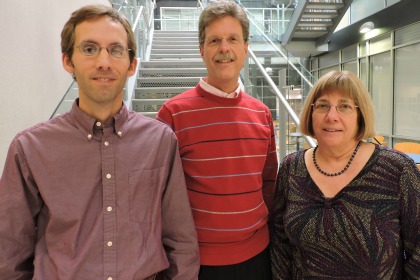
From left: UVM Cancer Center researchers Brian Sprague, PhD, Assistant Professor of Surgery, Donald Weaver, MD, Professor of Pathology and Laboratory Medicine, and Janet Stein, PhD, Professor of Biochemistry. (Photo: COM Design & Photography)
While better technology and screening practices have led to the detection of more breast cancers in women—many of which fall into a broad category of early-stage cancer, including ductal carcinoma in situ or DCIS—researchers still do not understand why some of these early cancers remain idle, while others progress. With the support of a new, $3.7 million federal grant from the National Cancer Institute (NCI), an interdisciplinary team of researchers at the University of Vermont (UVM) Cancer Center will be looking to answer this question.
Breast cancer is the most common cancer diagnosis among women and the majority of these cancers are detected by screening mammography. There is widespread concern that screening has led to over-detection of breast tumors that may not be aggressive but result in aggressive treatments for cancers that would never have been life-threatening. UVM Cancer Center researchers Brian Sprague, PhD, assistant professor of surgery, Janet Stein, PhD, professor of biochemistry, and Donald Weaver, MD, professor of pathology and laboratory medicine, will investigate the tumor environment for clues as to why some early cancers are so aggressive. They will be working to understand how breast cancers found through screening processes differ from those detected during follow-up evaluation of symptoms, in an effort to gather evidence about which screen-detected cancers may be most dangerous and which ones are likely to be indolent.
The focus of UVM’s research will be on the tumor environment, also known as the tumor “microenvironment”—the cells in and around a tumor or lesion that researchers believe may influence the progression of cancerous cells into larger tumors.
By identifying these environmental influencers, the study hopes to help determine which women can safely be spared aggressive treatments and related risks and consequences.
“This NCI funding is a testament to the UVM Cancer Center’s interdisciplinary breast cancer research strengths, including its statewide breast cancer surveillance program—one of just six such programs nationally—and high-level infrastructure and technology,” said Gary Stein, PhD, director of the UVM Cancer Center.
Other cancer centers across the country, including MD Anderson, Johns Hopkins, Stanford, Vanderbilt and UCLA, have been awarded sister grants through this collaborative NCI research program targeting similar objectives, but in different tumor sites. Joining UVM in investigating the microenvironment of breast cancer is the University of California, San Francisco. The Coordinating Center for the program is located at Dartmouth.
The five-year study hopes to yield new information that will ultimately lead to better decision-making around screening and treatment of early breast cancers.